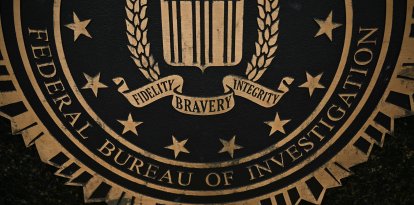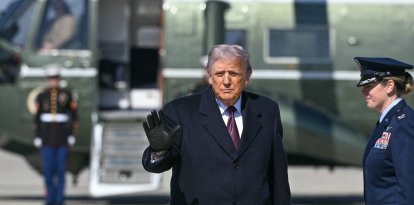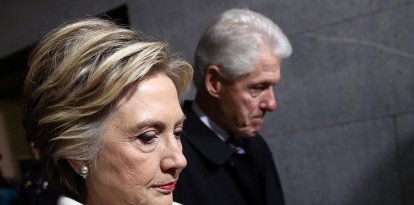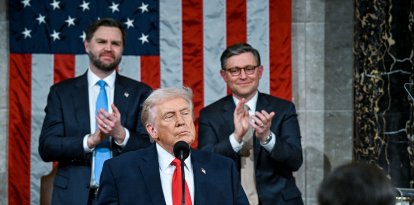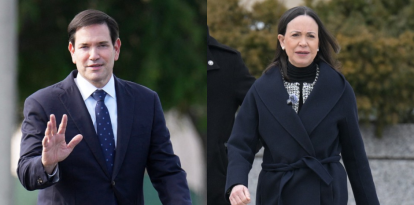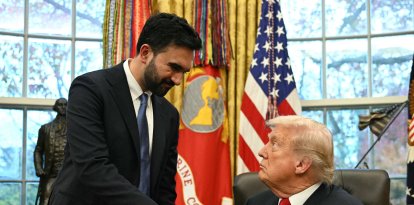A tipping point in swing states? What RFK Jr.'s Trump endorsement signifies
The once-independent candidate has a major impact in Arizona, Georgia, Wisconsin, Pennsylvania, Michigan, Virginia, North Carolina, and Nevada.

Montage of Republican Donald Trump and former candidate RFK Jr.
Robert F. Kennedy Jr. put an end to his candidacy and, after a harsh criticism of the Democratic Party, gave his endorsement to former President Donald Trump at a decisive moment in electoral terms.
With just over 70 days to go until Nov. 5, RFK Jr.'s endorsement signifies a potential turning point in swing states, where Vice President Kamala Harris and former President Trump compete head to head.
RFK Jr.'s withdrawal as an independent candidate comes at just the right time, several months after reaching his peak in the polls (surpassing double digits), but still maintaining some impact in states like Arizona, Georgia, Wisconsin, Pennsylvania, Michigan, Virginia, North Carolina, and Nevada; which still have no clear dominator.
The parity between Harris and Trump, along with the good impact of RFK Jr. in these states, allowed the former candidate to negotiate with the campaign of the former Republican president for several weeks, finally reaching an agreement for his endorsement.
Daniel Chang, a master's degree in political communication from American University and a member of the Dissident Project, told VOZ that the timing of RFK Jr.'s endorsement is positive for Trump for two reasons: It rests importance to the Democratic National Convention 2024 (which culminated Thursday) and may further boost the Republican candidate in the polls.
"On a narrative level, it's a big help for Trump. First, it takes some of the focus off the Democratic convention this week. Second, it's some needed good news after a month of good numbers for Democrats," Chang said. "On a vote level, it will help Trump, but 5% of RFK won't automatically go to Trump. Some of the RFK vote will go to Harris, some to some independent, and some will not vote. But, in a close election, any vote helps. Especially in key states."
The impact of RFK Jr.'s endorsement, according to polls
According to a summary of polls from The New York Times, RFK Jr.'s impact is far from negligible, especially in swing states.
For example, according to a series of Focaldata statewide polls conducted between Aug. 6 and Aug. 16, the former independent candidate was influential in most swing states.
In Pennsylvania, Focaldata put Harris ahead of Trump by one point (48-47%) and gave RFK four points that could be decisive in favor of the former president.
In North Carolina, a state Trump won in 2020 by three points, Harris is also ahead within the margin of error (47-46%), but RFK Jr. has five percentage points from where Trump could discount or come back.
It's a similar story with Virginia, a usually Democratic state where Trump is performing well. According to Focaldata, Harris is winning by three points (45-42%), and RFK Jr. is up six percentage points in the poll.
In another highly undecided state like Arizona, which went for Biden by about 13,000 votes in 2020, RFK Jr. also has a significant impact: Focaldata gives him seven points while Trump leads Harris by one point.
The Focaldata data is fairly consistent with a recent poll released by Redfield & Wilton Strategies and The Telegraph between Aug. 12 and Aug. 15.
For example, in Arizona, where Trump leads Harris 44-43%, RFK Jr. amassed support from 5% of respondents.
In Michigan, a state also narrowly settled in 2020 in Biden's favor, the independent would have 4% of the vote while Trump leads Harris by one percentage point, according to Redfield & Wilton Strategies/The Telegraph.
So does another respectable poll, The New York Times/Siena College, which released statewide polls between Aug. 9 and Aug. 14.
In those polls, RFK Jr. scored 4% in Nevada (with Trump up by two points), 4% in Georgia (with Trump up by three points), 4% in North Carolina (with Harris up by two points), and 5% in Arizona (with Harris leading Trump by five points).
In any case, in at least three credible, recent polls, RFK Jr.'s impact in key states ranged from 4-6% of support, with the differences between Harris and Trump within the margin of error indifferent to the presumed dominator.
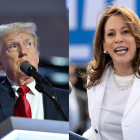
Elecciones 2024
¿El efecto Harris se acabó? Trump recupera su ventaja mínima según una importante encuesta nacional
Emmanuel Alejandro Rondón
Safe votes for Trump?
While it is very difficult to determine what percentage of RFK Jr.'s votes would go into Trump's accounts, at the moment, polls suggest that the former president would benefit.
According to an NBC News national poll, Kennedy attracts far more Republican voters, and his standing has declined significantly among independents, taking far more votes away from Trump than Harris.
"Kennedy attracts almost all of Trump’s third-party defectors July’s national NBC News poll also shows how the ballot changes from one with just the two major nominees to an expanded ballot that includes Kennedy," the news network reads.
One indication that RFK Jr. votes could benefit Trump is that, before Biden's withdrawal, RFK Jr. had between 8.5% and 10% of the national vote. However, since July 21, his support dropped to around 5%, so some analysts surmise that support is largely conservative-based.
Another key point is RFK Jr.'s positive impact among Hispanic voters, a key constituency in November. His favorability, according to a national YouGov poll, has been much higher among Hispanics, at +4 overall, while his average favorability is -8.
Although the data suggests that RFK Jr.'s support is not determinative in national polls, in swing states, which are likely to be defined by razor-thin margins, the once-independent candidate's turnout could be definitive and very important for Trump.
















